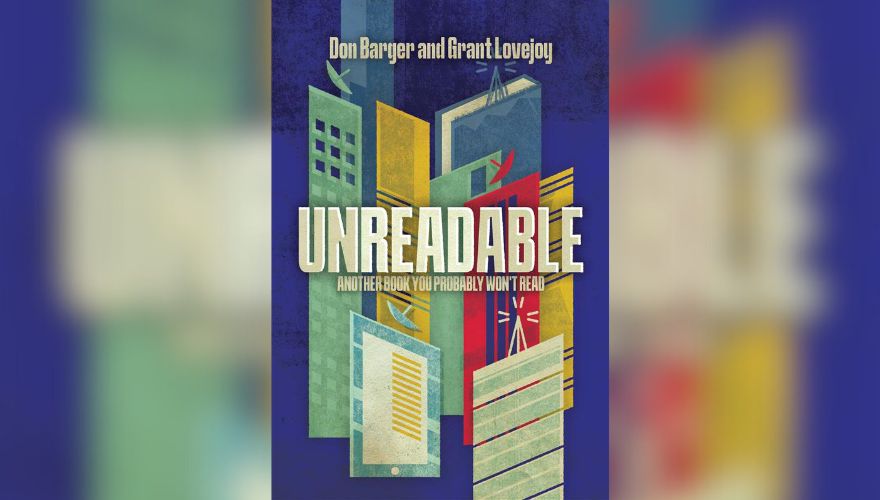

International Mission Board directors Don Barger and Grant Lovejoy released “Unreadable: Another Book You Probably Won’t Read” on August 5.
RICHMOND, Va. (BP) — His body sways slightly as the subway stops and starts. One hand grips the railing, the other clutches his phone. He watches a YouTube video about the importance of faith in today’s world and common misconceptions about Christianity.
He found the link to the video on the Internet. He is not a Christian, but he sent the link to a friend via text message and then followed the creator of the video on Instagram.
Gone are the days when most people read books to learn and get new information. Globally, not just in rural areas, people today prefer to learn through oral communication, be it on YouTube or social media, in person or through online interactions with friends, family and online contacts.
The book “Unreadable: Another Book You Probably Won’t Read” by Don Barger and Grant Lovejoy is a journey into the world of discoveries, how people obtain information and how this information shapes their view of themselves and the world.
Barger is the Director of Innovation and MX Labs at the International Mission Board (IMB). Lovejoy is the IMB’s Director of Scripture and Orality.
“‘Unreadable’ invites you to a conversation about how people in cities seek, acquire, process and share knowledge and how this process shapes their identities, loyalties, hostilities, fears, hopes and aspirations,” the authors write.
The book explores whether the methods people use to communicate correspond to the preferred methods of learning.
Barger and Lovejoy hope that “Unreadable,” released Aug. 5, will help missionaries effectively reach people, share the gospel and discover the power of oral communication as they plant churches in urban areas.
“Urban residents are accessible through social media initiatives that lead to conversations with Christians,” Lovejoy said. “Christians don’t have to be rocket scientists to use social media effectively for pastoral care.”
The authors point out the irony of writing a book to convey information to a society that prefers to learn orally. With this in mind, QR codes at the end of each chapter lead to a video summary of the chapter, giving the reader the option to consume the content in the form they prefer.
In cities around the world, Barger and Lovejoy conducted more than 200 interviews with people of different ages, faiths, ethnicities, socioeconomic backgrounds, and educated and uneducated populations. They interviewed people who grew up in cities and people who grew up in rural areas and moved to the city.
In interviews with new Christians, Barger and Lovejoy asked how they decided to follow Christ – through a brochure or book, a conversation, a video, or social media? They also interviewed Christian missionaries to learn what methods they use to spread the gospel.
Oral communication in missions is often associated with rural areas where literacy is less common. But that is not what Barger and Lovejoy found. Even most well-educated city dwellers do not like to read books.
One example is Alex, a PhD student in artificial intelligence. Much to Barger’s shock, Alex said he can’t stand reading and will do anything to avoid having to read a book. He would be more likely to respond positively to a national believer who uses online platforms to have honest conversations about his faith.
“Many people have told us they like to buy books but don’t usually read them. It’s as if learning happens by osmosis. We hope this book will spark a discussion about how people acquire information that makes them who they are and what they believe,” Barger said.
Lovejoy and Barger spoke with an immigrant in Europe who is a Christian but grew up in a Muslim home. In his home country, reading books is not common, but music and conversation are the centers of learning and communication. The believer plays guitar and sings in the squares of his European city, which attracts people from his ethnic group. When Lovejoy and Barger asked him how he spreads the gospel, he told them that he gives them a New Testament.
“He is a serious Christian witness, but one of his key communication strategies seemed to be inappropriate for his audience,” Lovejoy said. “This encounter underscored the importance of writing this book. We know that communication gaps like this can be closed.”
Todd Lafferty, IMB Executive Vice President and Chief Operations Officer, emphasized the importance of the book for international missions.
“‘Unreadable’ opens up a world of communication strategies that may surprise those who equate urban communication with literacy,” said Lafferty. “Jesus followers who want to impact their urban environments must approach their task with an open mind — and embrace the new digital frontier. It’s time to think like a digital missionary to reach the next generation.”
“Unreadable” can be ordered here from Amazon.
Don Barger is a native of Birmingham, Alabama, and attended the University of Alabama at Birmingham, Southwestern Baptist Theological Seminary in Fort Worth, Texas, and Mid-America Baptist Theological Seminary in Memphis, Tennessee.
Grant Lovejoy is a native of Oklahoma and studied at Baylor University in Waco, Texas, and Southwestern Baptist Theological Seminary in Fort Worth, Texas.
